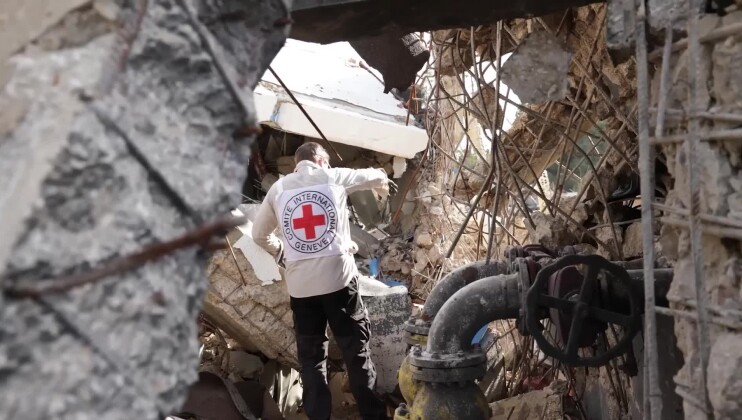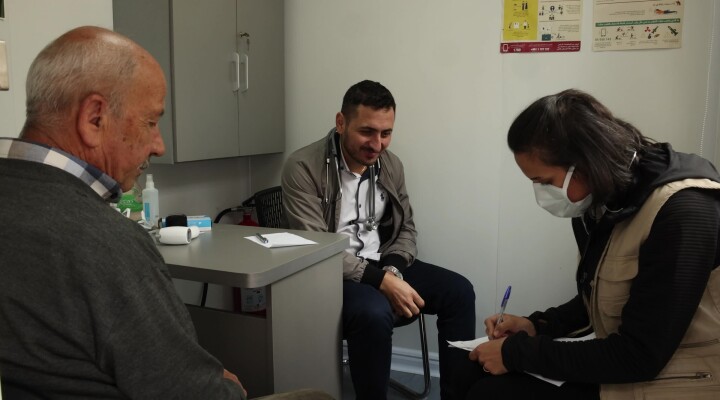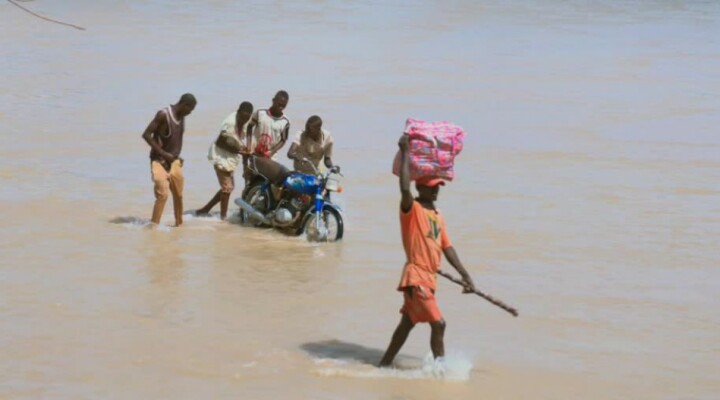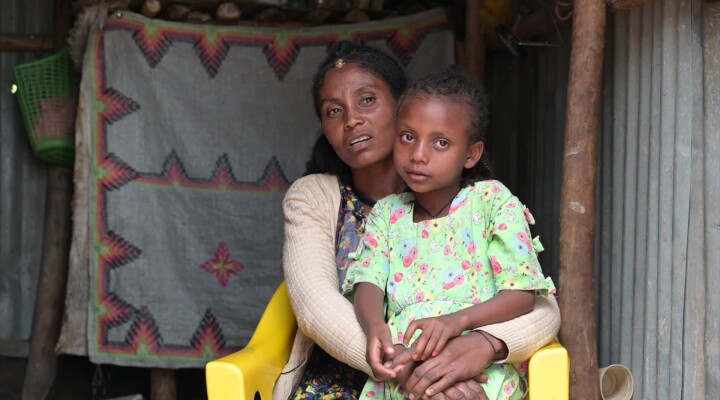تشكل مكافحة تفشي فيروس كورونا المستجد (كوفيد – 19) في السجون عمليةً صعبةً وتعمل اللجنة الدولية للصليب الأحمر على تعزيز الإجراءات الوقائية المعتمدة في أكبر سجن مركزي في لبنان
اللجنة الدولية للصليب الأحمر (بيروت) – نظرًا لعمل اللجنة الدولية للصليب الأحمر (المشار إليها في ما يلي ب"اللجنة الدولية") على محاربة مختلف أنواع الأوبئة الأخرى، باتت هذه الأخيرة على يقين بأن الزنزانات المكتظة وغير الصحية التي تعاني من ضعفٍ في التهوية تخلق بيئةً مثاليةً لانتشار الفيروس. ويجد المعتقلون أنفسهم عرضةً بشكل خاص لانتشار فيروس كورونا نظرًا لندرة توافر المياه النظيفة في السجون واعتبارها كشكل من أشكال الرفاه بالإضافة إلى نقص الصابون في العديد منها.
وقال علي عواضة، نجل أحد المحتجزين في سجن رومية المركزي أن: "والدي ، على سبيل المثال، يعاني من مرض اليرقان ونحن قلقون عليه. فأنا لا أبارح المنزل ولا أستقبل أي زائر كما أنه ما من أحد يدخل بيتي لكن والدي، من جهته، معرّض للغاية للإصابة بالفيروس".
على الرغم من عدم تسجيل أي حالات إصابة في السجون وأماكن الاحتجاز في لبنان، تعمل اللجنة الدولية مع سلطات السجون لدعم التدابير الوقائية وتعزيزها بهدف الحد من خطر انتشار العدوى وضمان تنمية الوعي لدى المحتجزين والموظفين والعاملين الصحيين في السجون بشأن الوباء وتزويدهم بالمعلومات والمعدات اللازمة ذات الصلة والدراية الفنية الضرورية.
وأكد العقيد ماجد الأيوبي، مدير سجن رومية المركزي، على حالة القلق السائدة قائلاً: "نحن قلقون وكذلك الموظفون والمحتجزون ونحاول قدر المستطاع تجنب انتشار الفيروس داخل المباني لاسيما وأنها قديمة وذات بنية تحتية ضعيفة وهشّة."
يشكّل سجن رومية المركزي مركز الإحتجاز الأكبر في لبنان وتتفاقم فيه مشكلة الإكتظاظ إذ يفوق عدد المحتجزين خلف قضبانه حاليًا ال 4000 محتجز. وتعمل اللجنة الدولية مع قوى الأمن الداخلي على تحسين البنية التحتية بهدف تعزيز مستوى النظافة الصحية وإنشاء جناح عزل مجهّز ومخصص لعزل المحتجزين وتقديم الرعاية الطبية اللازمة لهم في حال الإشتباه في إصابتهم بالفيروس او التأكد منها.
من جهته، تحدّث عبد الحليم أحمد، طبيب الاحتجاز في اللجنة الدولية للصليب الأحمر، عن حق المحتجزين في الحصول على الرعاية الصحية قائلاً: "نعتقد أن للمحتجزين الحق في تلقي خدمات الرعاية الصحية نفسها التي يستفيد منها باقي المجتمع ولهذا السبب قمنا بإنشاء غرف العزل الطبية." وبفضل هذا التدبير، يمكن للمحتجزين الحصول على خدمات الرعاية الصحية الضرورية بشكل فوري داخل السجن في حالة تفشي الفيروس. وتم أيضًا تجهيز جناح العزل بغرفة مخصصة لأخذ عينات المسحات (swab sampling) بشكل سريع وآمن داخل السجن وإرسالها إلى المختبر.
بالإضافة إلى نشاطاتها في سجن رومية، تقدم اللجنة الدولية الدعم إلى 12 سجناً أخرًا تحت إشراف وزارتي الداخلية والدفاع عبر تزويد الموظفين والعاملين في مجال الرعاية الصحية في هذه السجون بمعدات الحماية الشخصية وتأمين مستلزمات النظافة الصحية للمحتجزين وتقديم مواد لتنظيف المباني.
تشمل أنشطة اللجنة الدولية في سجن رومية المركزي ما يلي:
• تركيب عدد من المغاسل عند المدخل الرئيسي للسجن وعند مدخل كل من المباني التي يشملها سجن رومية للسماح للحراس بغسل أيديهم بطريقة منتظمة وسهلة.
• تقديم معدات الحماية الشخصية (من قفازات وأقنعة وصابون ومطهرات).
• تقديم فرش وعربات المستلزمات الطبية وعربات نقل الطعام وسطول لتعقيم الأحذية ليتم استخدامها في جناح العزل.
• توزيع الصابون على 4200 محتجز ومواد أخرى لتنظيف المباني كمساحيق التنظيف والمكانس وحاويات القمامة.
لمزيد من المعلومات يُرجى الاتصال بـ:
السيدة رونا الحلبي، المتحدثة الرسمية للجنة الدولية في لبنان، هاتف: +961 70 153 928، البريد الإلكتروني: ralhalabi@icrc.org
السيدة سارة الزوقري، المتحدثة الرسمية للجنة الدولية لمنطقة الشرق الأوسط، بيروت، هاتف: +961 3138 353، البريد الإلكتروني: salzawqari@icrc.org
SHOTLIST
Locations: Roumieh Central Prison, Lebanon / Bir Hassan, Beirut, Lebanon (family of a detainee’s house)
Camera: Charbel Barakat, Miriam Atallah
Filming dates: 16.04.20, 30.04.20, 04.05.2020
Length: 05:40
Format: HD, mp4
On-screen credit: ICRC
Access all
ICRC Ref: 20200507-Lebanon-COVID19_Detention
00:00 Timelapse showing the sky and the barbed wires above the walls of Roumieh Central Prison in Lebanon.
00:08 Construction workers, cutting and fixing steel equipment outside the newly allocated building for quarantine inside the prison.
00:10 Construction worker helping in lifting a steel item outside the quarantine building.
00:15 Construction workers inside the lift’s cabinet
00:18 Construction workers inside the lift’s cabinet pulling a rope with the ventilation tube attached to it.
00:21 Various shots of workers fixing the aluminum and glass of the Anteroom.
00:28 Recovery ward in Roumieh prison, workers removed the cement table to transform the hall into a hospital.
00:32 ICRC staff member walking inside the hall that is going to be transformed into a recovery area inside the Roumieh prison.
00:35 Various shots from inside the windows of the hall
00:40 Electricity work closeup inside the quarantine area.
00:42 ICRC staff members in the finalized Anteroom.
00:46 Fixing the Negative Pressure alarm outside the “samples’ room”.
00:50 Roy Aoun, Engineer at the water and habitat department ,ICRC, trying the automatic aluminum door inside the Anteroom.
00:53 Various shots inside the prison.
01:05 ICRC staff member washing their hands.
01:14 Dr. Abdolhaliem Ahmad, Detention Doctor,ICRC, wearing the PPE inside the Anteroom, separating the clean and infected areas inside the prison.
01:31 Various signs inside the prison.
01:43 Inside of a prison cell.
Soundbite 1: Abdolhaliem Ahmad , Detention Doctor, ICRC
01:46 “Some of the challenges that face medical teams to prevent the spread of such viruses are the lack of ventilation in places of detention, the overcrowding, in addition to the limited access to healthcare services in general.
02:05 Moreover, the general recommendations that apply in the community, like social distancing and staying home, do not apply in places of detention.
02:17 Some detainees are elderly, some suffer from chronic diseases, others have physical disabilities or have certain mental health conditions.
02:33 At ICRC, we believe that detainees have the right to receive the same health care as the community. That is why we set up medical isolation rooms where detainees can have immediate necessary health care assistance on the premises if suspected to have contracted COVID-19.
03:00 We also equipped a swab sampling room where samples can be quickly and safely collected to be sent for laboratory testing without having to move detainees outside Roumieh prison.”
Soundbite 2: Ali Mohamed Awada, Son of a detainee, Bir Hassan, Lebanon
03:10 Roumieh is an overcrowded prison. There are elderly people and there are sick people. My father, for example has jaundice.
03:21 There are large numbers of people in this prison interacting in close proximity, eating from each other’s food and sitting close to each other.
03:29 There are no preventative measures to protect them.
03:34 What worries us is him [my father]. As for me, today, I am staying at home. No one visits me, speaks to me or comes into my house. But he [my father] is exposed. Very exposed.”
03:42 Cut-aways of Ali Mohamed Awada
Soundbite 3: Colonel Majed Al Ayoubi, Roumieh Central Prison Commander
03:54 “We are worried, and so are the staff members and the detainees.
04:00 We are trying as much as we can to avoid the spread of the virus inside the building especially that these buildings are old with weak infrastructure and given that the health conditions in general are poor.”
04:16 We started with disinfection measures from Roumieh’s main entrance all the way to the buildings inside. We entered the buildings and we disinfected all the visiting rooms, the scanner, and the patios.”
04:30 We installed thermometers at each entrance in Roumieh.
04:35 The temperature of the visitor is being taken as well as the guests entering Roumieh.
04:40 Visitors for the prisoners were limited to immediate family members. Only one family member can visit the detainee.”
04:48 Cut-aways of Colonel Majed Al Ayoubi
Soundbite 4: Roy Aoun, Engineer at the water and habitat department ,ICRC, Lebanon
O4:55 “Since Roumieh is the biggest prison in Lebanon, the ICRC, in cooperation with the Internal Security Forces, is implementing precautionary measures in Roumieh like installing additional hand washing points at the entrances of the buildings and setting up
O5:18 a medical isolation ward inside the prison.
O5:24 This ward was equipped to ensure a proper insulation between the safe area and the exposed area.
O5:30 An additional ward was also prepared where recovered patients can stay to avoid their exposure to another infection.”
05:38 Cut-aways of Roy Aoun
05:40 ENDS



